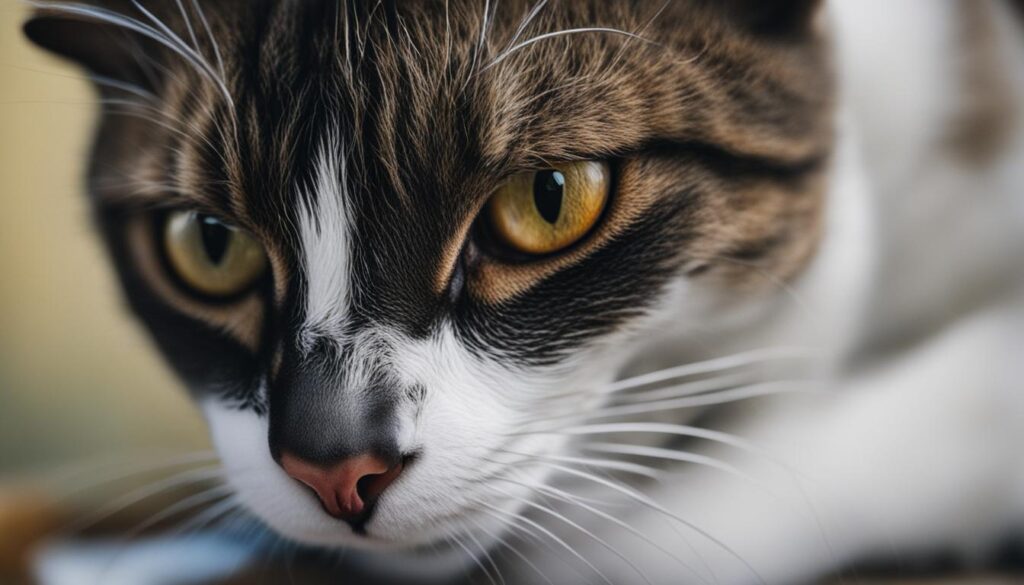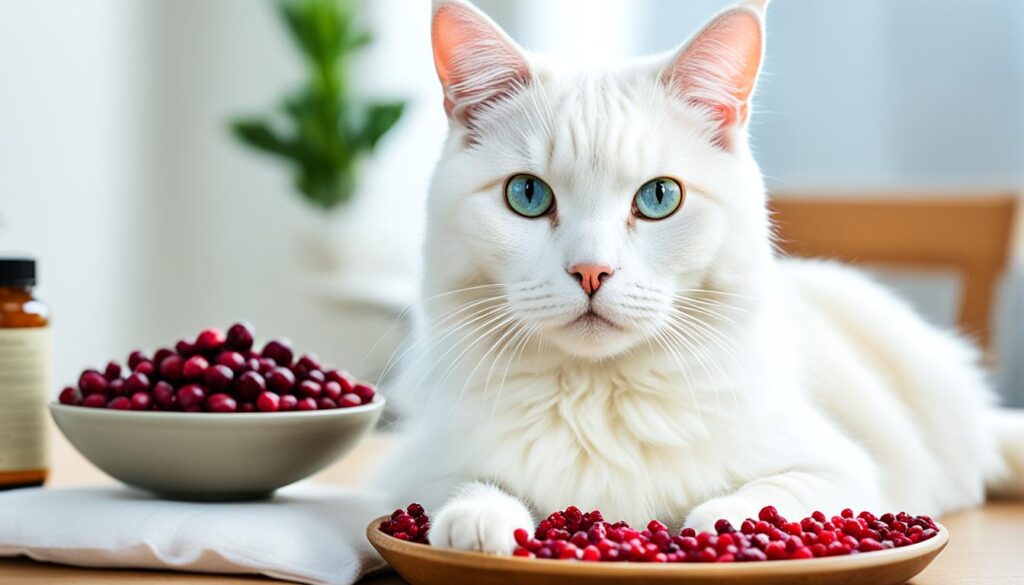Home Remedies for Your Cat’s UTI – Quick Guide
A cat’s urinary tract infection (UTI) can cause discomfort and pain. While it’s always important to consult with a veterinarian for proper diagnosis and treatment, there are several home remedies you can try to help manage your cat’s UTI at home.
Increasing water intake is a simple yet effective way to flush out bacteria and support urinary tract health. Encourage your cat to drink more water by providing multiple water bowls throughout your home and using water fountains that can entice them to drink.
In addition to increasing water intake, reducing stress is crucial in alleviating bladder inflammation. Create a calm and safe environment for your cat by providing hiding spots, quiet areas, and interactive toys to keep them mentally stimulated and stress-free.
Using prescription diets formulated for urinary health can also be beneficial for managing a cat UTI. These diets help maintain a healthy urinary environment by controlling pH levels and promoting proper digestion.
Maintaining a clean litter box is essential to prevent discomfort and encourage your cat to urinate regularly. Scoop the litter box daily and change the litter regularly to maintain hygiene and prevent bacteria accumulation.
Lastly, consider utilizing homeopathic UTI supplements to support your cat’s urinary tract health. Natural remedies such as cranberry, d-mannose, and other herbal supplements can help alleviate symptoms and promote recovery.
Key Takeaways:
- Increasing water intake can help flush out bacteria from your cat’s urinary tract.
- Reducing stress can alleviate bladder inflammation and promote urinary tract health.
- Using prescription diets formulated for urinary health can support your cat’s urinary system.
- Maintaining a clean litter box can prevent discomfort and encourage proper urination.
- Homeopathic UTI supplements such as cranberry and herbal remedies can provide additional support for your cat’s urinary tract health.
Understanding Cat UTIs and Common Symptoms
A urinary tract infection (UTI) in cats occurs when bacteria travels up the cat’s urethra and infects the bladder. This condition can cause discomfort and pain for our feline friends. Recognizing the symptoms of a cat UTI is crucial in ensuring timely diagnosis and treatment.
- Frequent trips to the litter box: Cats with UTIs may exhibit a heightened frequency of urination.
- Small amounts of urine: When a cat has a UTI, they may only produce small volumes of urine.
- Crying or howling while urinating: UTIs can lead to painful urination, causing cats to vocalize their discomfort.
- Excessive licking of the genitals: Cats with UTIs often engage in excessive grooming of their genital area as a result of irritation.
- Blood in the urine: The presence of blood in a cat’s urine is a concerning sign, warranting immediate medical attention.
- Straining to urinate: Cats may display difficulty or straining when attempting to urinate due to a UTI.
- Urinating outside of the litter box: In some cases, cats with UTIs may urinate outside of their designated litter box.
It’s important to note that these symptoms can also be indicative of other urinary disorders. Therefore, consulting with a veterinarian is crucial to obtain an accurate diagnosis and appropriate treatment plan.

Understanding the symptoms of a cat UTI is the first step in providing proper care and treatment for our beloved feline companions. In the next section, we will explore the various veterinary care options available for diagnosing and treating cat UTIs and other urinary issues.
Veterinary Care for Cat UTIs and Other Urinary Issues
If you suspect your cat has a UTI or another urinary issue, it’s essential to seek veterinary care. A veterinarian will perform diagnostic tests to determine the cause and severity of your cat’s urinary problem. These tests may include:
- Urine culture: This test identifies the presence of bacteria in the urine, helping to diagnose a cat UTI.
- Urinalysis: By analyzing the urine, the veterinarian can detect any signs of inflammation, crystals, or blood.
Based on the results of these tests, your vet will develop a treatment plan tailored to your cat’s specific needs. The treatment for a cat urinary tract infection may include:
- Antibiotics: Prescription antibiotics are commonly used to target and eliminate the bacteria causing the UTI.
- Special Prescription Diets: Veterinarians may recommend specific diets to create an unfavorable environment for bacteria or prevent crystal formation.
- Pain Medications: To alleviate any discomfort, your vet may provide pain medications to help your cat feel better.
- Antispasmodic Medications: These medications can help relax the muscles of the urinary tract, reducing pain and alleviating spasms.
In addition to UTIs, other urinary issues in cats include urinary crystals, bladder stones, and feline idiopathic cystitis. These conditions require proper diagnosis and treatment by a veterinarian. Alternative treatments such as home remedies and holistic approaches should be used in conjunction with professional veterinary care, rather than as standalone solutions.

Seeking veterinary care is crucial in ensuring the correct diagnosis and appropriate treatment for your cat’s urinary issue. With the guidance of a veterinarian, you can provide the necessary care to support your cat’s urinary tract health and overall well-being.
Home Remedies for Cat UTIs
While it’s important to consult with a veterinarian for proper diagnosis and treatment, there are several home remedies that can help manage a cat UTI. These natural remedies can be used in conjunction with veterinary care to support your cat’s urinary tract health.
1. Increase Water Intake
Encouraging your cat to drink more water can help flush out bacteria from their urinary system. Consider providing multiple water sources, using a pet water fountain, or adding wet food to their diet, as it contains higher moisture content.
2. Reduce Stress
Stress can exacerbate bladder inflammation in cats. Creating a calm and soothing environment by providing hiding spots, using synthetic pheromone diffusers, and spending quality time with your cat can help alleviate stress and support their urinary health.
3. Prescription Diets
Certain prescription diets are formulated to maintain a healthy urinary environment for cats. These diets are designed to control urinary pH, reduce the formation of crystals and stones, and promote overall urinary tract health. Consult with your veterinarian to determine the most suitable prescription diet for your cat.
4. Maintain a Clean Litter Box
Dirty litter boxes can cause discomfort for cats with UTIs. Ensure that the litter box is clean and easily accessible for your cat. Consider using unscented litter and providing multiple litter boxes if you have multiple cats in your household.
5. Utilize Homeopathic UTI Supplements
Homeopathic UTI supplements, such as cranberry extract and d-mannose, can help support urinary tract health in cats. These natural supplements may have antibacterial properties and promote a healthy bladder environment. However, it’s essential to consult with a veterinarian before adding any supplements to your cat’s routine.
Remember to consult with a veterinarian for the appropriate diagnosis and treatment of your cat’s UTI. Home remedies should always be used in conjunction with veterinary care to ensure the best outcome for your cat’s health.
| Home Remedies for Cat UTIs | Benefits |
|---|---|
| Increase water intake | Flushes out bacteria from the urinary system |
| Reduce stress | Alleviates bladder inflammation |
| Prescription diets | Maintains a healthy urinary environment |
| Maintain a clean litter box | Prevents discomfort and helps with hygiene |
| Utilize homeopathic UTI supplements | Supports urinary tract health naturally |
Conclusion
Cat UTIs can be a source of discomfort for both cats and their owners, but there are effective ways to manage them. Home remedies, such as natural remedies for cat UTI, can help alleviate symptoms and support urinary tract health. However, it’s important to remember that these remedies should not replace veterinary care.
If you suspect your cat has a UTI or another urinary issue, it’s crucial to consult with a veterinarian for proper diagnosis and treatment. They have the expertise to accurately diagnose and prescribe the necessary treatment options. By combining veterinary care with home remedies, you can provide holistic and comprehensive care for your cat’s urinary health.
At-home care for cat urinary issues involves implementing strategies to prevent future UTIs and support overall urinary tract health. This includes maintaining a clean litter box to prevent discomfort, promoting increased water intake to flush out bacteria, and reducing stress to alleviate bladder inflammation. Additionally, utilizing homeopathic UTI supplements, such as cranberry, d-mannose, and other natural supplements, may help support your cat’s urinary health.
Remember, while home remedies can provide relief for your cat’s UTI symptoms, it’s essential to work closely with a veterinarian to ensure the best possible care. By combining veterinary expertise with at-home care strategies, you can help manage your cat’s UTI and promote their overall urinary tract health.
FAQ
How can I treat my cat’s UTI at home?
While it’s important to consult with a veterinarian for proper diagnosis and treatment, there are several home remedies you can try to help manage your cat’s UTI at home. These remedies include increasing water intake, reducing stress, using prescription diets, maintaining a clean litter box, and utilizing homeopathic UTI supplements.
What are the common symptoms of a cat UTI?
Common symptoms of a cat UTI include frequent trips to the litter box, only producing small amounts of urine, crying or howling while urinating, excessive licking of the genitals, blood in the urine, straining to urinate, and urinating outside of the litter box. These symptoms can also be indicative of other urinary disorders, so it’s crucial to consult with a veterinarian for proper diagnosis and treatment.
How do veterinarians diagnose and treat cat UTIs?
Veterinary care for cat UTIs involves diagnostic tests such as a urine culture and urinalysis to determine the presence of bacteria, crystals, or inflammation in the urine. Depending on the cause of the urinary issue, the vet may recommend antibiotics, special prescription diets, pain medications, or antispasmodic medications. Other common urinary issues in cats include urinary crystals, bladder stones, and feline idiopathic cystitis. Veterinary care is crucial in determining the proper treatment for your cat’s specific condition.
What are some home remedies for cat UTIs?
Home remedies for cat UTIs include increasing water intake to flush out bacteria, reducing stress to alleviate bladder inflammation, using prescription diets to maintain a healthy urinary environment, keeping the litter box clean to prevent discomfort, and utilizing homeopathic UTI supplements such as cranberry, d-mannose, and other natural supplements. Other supplements such as synthetic pheromone diffusers, CBD, urinary acidifiers, and Cosequin may also help alleviate urinary issues in cats. These home remedies can be used in conjunction with veterinary care to support your cat’s urinary tract health.
Can home remedies replace veterinary care for cat UTIs?
No, home remedies should not replace veterinary care for cat UTIs. While home remedies can help alleviate symptoms and support urinary tract health, it’s important to consult with a veterinarian for proper diagnosis and treatment. By combining veterinary care with home remedies, you can provide holistic and comprehensive care for your cat’s urinary health.


